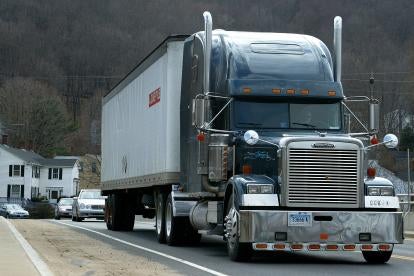We’ve all experienced it. You are driving down the freeway at 65 miles per hour in the middle lane. Suddenly a massive eighteen wheeler looms in your rearview mirror. Or one roars past you well in excess of the speed limit. Or, even worse, both trucks barrel down on you at the same time. It is intimidating and frightening to be in the path of an 80,000 pound big rig while driving in a 3000 pound car. And you should be frightened because that truck driver may be exhausted, on the verge of falling asleep, and about to crash into you or the cars around you.
Crashes with big trucks are on the rise. The Federal Motor Carrier Safety Administration (FMCSA)’s most recent report showed that large truck injury crashes increased by 21% in 2014. The increase is generally attributed to loosening of safety regulations prompted and funded by truck lobbyists, and pressure on commercial drivers to push the limits of safety to meet contract goals. To prevent crashes from tired drivers, one of the safety rules the FMCSA imposes is a restriction on the length of driving time allowed in a 24 hour period coupled with adherence to mandatory rest periods. If a driver has a crash because he or she pushed these rules; or if they have a health condition that prevents them from resting, they are criminally negligent. Even though they may be responsible, it is almost always the people in the surrounding cars that take the biggest hit—in the form of a 40 ton truck smashing into the car and killing or severely injuring the occupants.
The FMCSA recommends that big truck drivers be checked and treated for sleep apnea. Sleep apnea is a condition where a person suffers pauses in breathing that disrupts sleep. As a result, those with the condition sleep poorly and become chronically tired. A Harvard School of Public Health study of 3600 truck drivers showed that those with untreated sleep apnea are 5 times more likely to crash. According to the American Academy of Sleep Medicine, 20 percent of commercial truck drivers suffer from the condition and may be driving impaired—right next to you on the freeway. And this experience is similar to having a drunk driver next to you. Christopher Drake, an associate scientist at the Henry Ford Hospital Sleep Disorders and Research Center in Detroit, sums it up: “Sleep deprivation is the same as being impaired from alcohol. We know from experimental studies that just four hours of sleep loss will produce as much impairment as a six pack (of beer).”
Truck lobbyists loudly protest the recommendation to test for sleep apnea and recently slipped a requirement into a congressional bill that forces FMCSA to go through the formal congressional process to get approval for the sleep apnea testing requirement. This could take years leaving long haul big truck drivers, nearby car drivers, and you, at an increased risk for serious crashes, serious injury and death.
Injuries from these types of crashes are usually very serious and often permanent. If you or anyone you know has been in a crash with a big truck, a bus, or any other commercial carrier, you should seek advice from an experienced attorney who understands how and whose insurance covers your injuries, commercial driver rules, and legal liability for conditions such as sleep apnea.



 i
i

